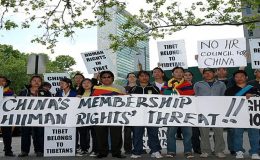Tibet Activists call for more UN Member States to join the growing move to hold China accountable
Tibet rights activists have slammed UN Members for electing China to the UN Human Rights Council today in light of its ruthless crackdown on human rights which blatantly undermines the UN’s own charter. [1] At the same time, the 30% drop in yes votes shows that the number of governments choosing not to shy away from their responsibility to hold China accountable is growing. While 139 UN Member States voted to allow China a seat on the Human Rights Council, over a quarter of the international community took a stand to not reward the Chinese government’s assault on freedoms in the secret ballot. [2] Not only did China receive the least number of votes out of all those elected in their regional category, they also received fewer votes than any other Member States elected to the Council today.
Pema Doma, Students for a Free Tibet, said: “139 UN Member states have made a mockery of the Human Rights Council. There is simply no justification as to why governments have voted for China to sit on the UN’s highest rights body. China’s appointment will only serve to further jeopardize the lives and safety of Tibetans, Uyghurs, Chinese, Hongkongers and Southern Mongolians who already live under one of the world’s most brutal regimes. But the growing international consensus that China’s brutal assault on human rights cannot, and must not, go unchallenged is reflected in the 30% decrease in votes for China since its last election in 2016.”
Gloria Montgomery of Tibet Advocacy Coalition said: “Governments missed a vital opportunity today to show their commitment to the promotion and protection of human rights, with 139 UN Member States opting to turn their backs on those suffering under China’s repressive grip. Yet, the massive reduction in votes cast in favour of Beijing represents a clear sign that the tide is turning. More and more countries are waking up to the fact that the Tibetan people deserve serious engagement from international players to ensure justice and accountability.”
Mandie McKeown, International Tibet Network, said: “China’s dire record at upholding human rights has continued to deteriorate year after year and today’s vote will only allow China to use its position to shield itself from accountability for its widespread and systematic human rights violations. Those principled States that voted against China’s election must now come forward and find solutions to hold them accountable for their serious human rights abuses.“
The Chinese government is responsible for systematic and gross human rights violations in Tibet, East Turkestan, Hong Kong, Southern Mongolia and China. Members of the Human Rights Council are required to “uphold the highest standards in the promotion and protection of human rights”, but China has time and time again broken its UN commitments, including to allow independent UN monitors access to the country.
The catalogue of evidence of China’s brutal assault on human rights in Tibet, East Turkestan, Hong Kong and Southern Mongolia should in itself have been enough to ensure world governments voted no to China’s election bid. When coupled with abject further failures to cooperate with the United Nations, and systematic efforts to undermine freedoms globally, it is utterly untenable that China is a fit candidate for the Council. [3]
Human Rights groups, including a Coalition of over 100 Tibet groups, [4] called on Members of the General Assembly to heed this opportunity and deny a seat to China’s abusive government, under which Tibet has become the second least free place in the world for civil and political rights, after only Syria [5].
China has now occupied Tibet for over seventy years; seven decades in which they have sought to crush the Tibetan identity, weaken the influence of the exiled Dalai Lama, and assimilate Tibet into mainland China. Yet for generations, Tibetans have continued to actively resist Chinese rule, through protests, non-violent direct action, or by escaping into exile.
China’s response to dissent has been brutal; the elevation of Xi Jinping and China’s 5th generation leaders in 2012 brought no positive changes in human rights, rather the reverse. During the past decade, the Chinese government has been increasingly hostile towards human rights defenders, unleashing a harsh crackdown on civil society, especially in Tibet.
The human rights situation in Tibet has reached an unprecedented low. Since the start of 2020, over half a million Tibetans have been coerced into militarised labour facilities in Tibet, where they are subjected to indoctrination, ideological training, intrusive surveillance, and mass relocation. [6] The Chinese authorities continue to ignore calls, including by the UN Committee against Torture, to investigate the circumstances surrounding his death and hold those accountable to justice.
China has failed to take effective measures to address these violations, and it has aggressively persecuted civil society activists for defending human rights, including seeking participation in UN HRC activities. China has excluded independent members of civil society from playing important roles in promoting and protecting human rights at the national and international levels. China’s successful election to the Council for a fifth term will only further undermine the ability of the HRC to promote and protect human rights.
-end-
CONTACTS:
Gloria Montgomery, Tibet Advocacy Coalition, +44 (0)7541362001
Mandie McKeown, International Tibet Network, +44 (0)7748158618
Pema Doma, Students for a Free Tibet, +1 (617) 792-3606
NOTE TO EDITORS:
[1] “In accordance with General Assembly resolution A/RES/60/251, when electing members of the Human Rights Council, Member States shall take into account (1) the contribution of candidates to the promotion and protection of human rights and (2) their voluntary pledges and commitments made thereto http://www.ohchr.org/Documents/HRBodies/HRCouncil/Pledges.pdf.
[2] Out of a possible 193 votes, China received 139 in favour. The identity of governments that did not vote for China or abstained is not known as the vote was a secret ballot.
[3] Tibet Advocacy Coalition Briefing, ‘China’s Failure to Cooperate with the United Nations’: https://tibetnetwork.org/free1/wp-content/uploads/2020/10/UN-FOCUSED-Briefing-China-at-the-UN.pdf
[4] Open letter from over 100 global Tibet groups to UN States urging they “take a stand” and vote against China’s election to the Human Rights Council: https://tibetnetwork.org/open_letter_unhrc_election_2020/
[5] Freedom House, Freedom in the World, Countries and Territories: https://freedomhouse.org/countries/freedom-world/scores
[6] Jamestown Foundation, Xinjiang’s System of Militarized Vocational Training Comes to Tibet, 22 September 2020: https://jamestown.org/program/jamestown-early-warning-brief-xinjiangs-system-of-militarized-vocational-training-comes-to-tibet/





